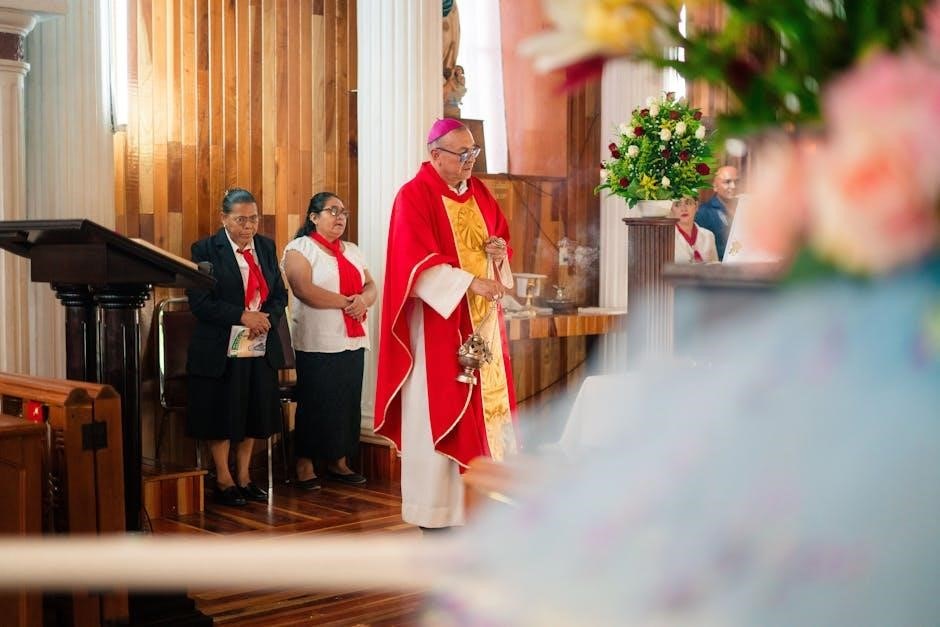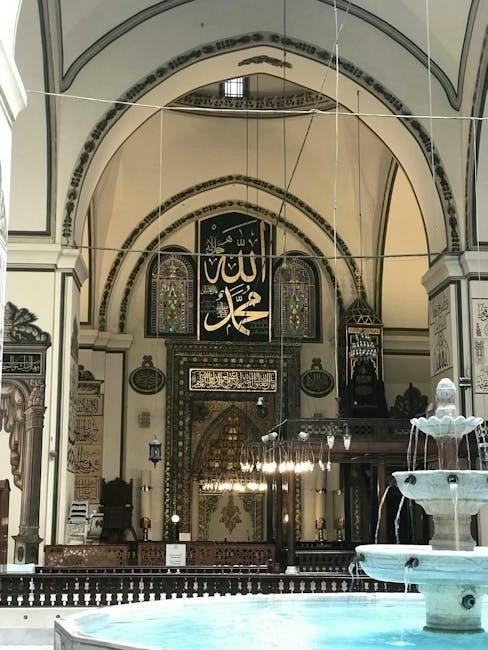The Modeh Ani prayer is a heartfelt Jewish blessing expressing gratitude upon waking. Recited daily, it acknowledges the gift of life and restoration of the soul.
1.1 What is the Modeh Ani Prayer?
The Modeh Ani prayer is a short, heartfelt blessing recited upon waking. It expresses gratitude to God for restoring one’s soul and granting another day of life. This prayer, part of the morning blessings, is typically recited before rising from bed, acknowledging the divine gift of existence and renewal. Its simplicity and depth make it a meaningful start to daily Jewish practice.
1.2 Importance of Gratitude in Jewish Prayer
Gratitude is a cornerstone of Jewish prayer, reflecting a deep appreciation for life’s blessings. The Modeh Ani prayer embodies this value, fostering a mindset of thankfulness. By acknowledging divine benevolence, it cultivates humility and joy, setting a positive tone for the day. Gratitude in prayer strengthens spiritual connection and mindfulness, emphasizing the sacredness of each moment and the gift of existence.

Historical Background of the Modeh Ani Prayer
The Modeh Ani prayer traces its roots to ancient Jewish liturgical traditions, evolving over centuries as a morning blessing. Its origins reflect a timeless appreciation for divine renewal.
2.1 Origins and Development
The Modeh Ani prayer has its roots in traditional Jewish blessings, with its earliest forms appearing in medieval liturgical texts. It emerged as a simple yet profound expression of gratitude for life’s renewal. Over time, it evolved into a standardized prayer, incorporated into the morning routine, reflecting the enduring Jewish emphasis on acknowledging divine compassion and the gift of existence. Its concise yet meaningful structure has made it a cherished part of daily worship.
2.2 Evolution of the Prayer Over Time
The Modeh Ani prayer has evolved from a simple, personal expression of gratitude to a standardized blessing in Jewish liturgy. Originating in medieval times, it gained prominence in the 16th century with its inclusion in the Shulchan Aruch. Over centuries, variations emerged across Ashkenazi and Sephardic communities, yet its core theme of thanking God for life’s renewal remained unchanged. Today, it is widely recited, reflecting enduring spiritual values and its timeless relevance in Jewish practice.

The Significance of the Modeh Ani Prayer
The Modeh Ani prayer holds profound significance as a morning prayer, fostering gratitude, spiritual awakening, and emotional renewal. It connects individuals to divine providence, emphasizing life’s preciousness and daily renewal, while nurturing a deeper connection to faith and personal reflection.
3.1 Spiritual and Emotional Impact
The Modeh Ani prayer deeply nurtures spiritual growth by cultivating gratitude and mindfulness. It emotionally uplifts individuals, fostering a sense of renewal and connection to divine providence. Reciting it upon waking helps align one’s heart with humility, trust, and joy, setting a positive tone for the day. This prayer also serves as a powerful reminder of life’s preciousness and the divine restoration of the soul each morning.
3.2 Role in Daily Jewish Practice
The Modeh Ani prayer holds a central place in daily Jewish observance, serving as the first words recited upon waking. It initiates the day with gratitude and mindfulness, reflecting a core Jewish value of acknowledging divine kindness. This brief yet profound blessing is universally recited across Jewish communities, emphasizing the importance of beginning each day with a sense of purpose and spiritual connection.

The Text and Translation of Modeh Ani
The Modeh Ani prayer is מודה אני לפניך מלך חי וקים שהחזרת בי נשמתי חמלה רבה אמונתך, meaning, “I gratefully thank You, eternal King, for returning my soul with compassion; Your trust is vast.”
4.1 Hebrew Text with Transliteration
The Hebrew text of Modeh Ani is:
מוֹדֶה אֲנִי לְפָנֶיךָ מֶלֶךְ חַי וְקַיָּם שֶׁהֶחֱזַרְתָּ בִּי נִשְׁמָתִי חֶמְלָה רַבָּה אֱמוּנָתֶךָ.
Transliterated, it reads: Modeh ani l’fanecha melech chai v’kayam shehechezarta bi nishmati chemlah rabbah emunatecha. This prayer is concise yet profound, reflecting gratitude for life and divine trust.
4.2 English Translation and Interpretation
The English translation of Modeh Ani is: “I gratefully thank You, O living and eternal King, for You have mercifully restored my soul within me; Your faithfulness is great.” This prayer expresses profound gratitude for the gift of life, acknowledging God’s trust and mercy in renewing one’s spirit each morning. It embodies a deep appreciation for existence and divine providence.
When and How to Recite Modeh Ani
Modeh Ani is recited immediately upon waking, before any other words are spoken. It is said with intention and gratitude, setting a positive tone for the day.
5.1 The Ideal Time for Recitation
The Modeh Ani prayer is ideally recited immediately upon waking, while still in bed, before engaging in any other activity or speech. This moment is considered sacred, as it marks the transition from sleep to wakefulness, allowing one to express gratitude for the renewal of life and the return of the soul. Reciting it at this time fosters mindfulness and sets a positive tone for the day ahead.
5.2 Proper Etiquette and Focus

Proper etiquette for reciting Modeh Ani involves focusing on the prayer’s meaning with intention and sincerity. It should be said slowly and thoughtfully, avoiding distractions. One should stand with respect, facing the direction of prayer if possible. The prayer is best recited in a calm and humble state of mind, fostering a deep connection to its message of gratitude and renewal. This focus enhances its spiritual impact.

The Modeh Ani Prayer in Jewish Law
The Modeh Ani prayer is rooted in Jewish law, emphasizing gratitude as a fundamental duty. It is based on Torah and Talmudic teachings, classified as a blessing of thanks, and is a vital part of daily worship practices, reflecting adherence to halachic principles and the importance of mindful recitation.
6.1 Halachic Perspectives
The Modeh Ani prayer is a morning blessing rooted in Jewish law, emphasizing gratitude. According to halacha, it is recited immediately upon waking, before any other speech or action. The prayer reflects the obligation to thank God for restoring the soul, as stated in the Shulchan Aruch. It is considered a fundamental part of daily worship, highlighting the importance of mindfulness and appreciation in Jewish practice.
6.2 Customs and Variations Across Communities
Various Jewish communities have unique customs surrounding the Modeh Ani prayer. Ashkenazi and Sephardic traditions may differ slightly in pronunciation or accompanying prayers. Some communities recite it aloud in synagogues, while others emphasize private recitation. Additionally, variations exist in the inclusion of additional blessings or songs following the prayer, reflecting diverse cultural and liturgical practices within the broader Jewish tradition.
The Modeh Ani Prayer and Personal Reflection
The Modeh Ani prayer invites personal reflection, fostering mindfulness and gratitude. It encourages individuals to connect with their faith, promoting spiritual growth and daily intention.
7.1 Connecting with the Prayer’s Meaning
Connecting with the Modeh Ani prayer involves understanding its profound message of gratitude and renewal. By reflecting on its words, individuals can foster a deeper sense of appreciation for life and divine restoration. This prayer encourages mindfulness and spiritual connection, helping to cultivate a meaningful relationship with faith and daily existence. Personal reflection enhances its impact, making it a powerful tool for spiritual growth and introspection.
7.2 Incorporating Personal Intentions
Incorporating personal intentions into the Modeh Ani prayer enhances its spiritual impact. By reflecting on personal experiences and aspirations, individuals can add specific prayers or expressions of gratitude. This practice not only deepens the connection to the prayer’s essence but also makes it a meaningful and customizable part of daily spiritual life, encouraging mindfulness and personal growth.
Teaching Modeh Ani to Children
Teaching Modeh Ani to children fosters gratitude and spiritual awareness early in life. Simple, engaging methods help kids connect with the prayer’s meaning and significance daily.
8.1 Educational Approaches
Engage children with interactive methods like songs, visuals, and storytelling to explain Modeh Ani’s significance. Break down the prayer into simple parts, emphasizing gratitude and God’s role in restoring life. Encourage repetition and daily practice to build routines. Use age-appropriate language and hands-on activities to make learning enjoyable and meaningful, fostering a deep connection to Jewish heritage and spiritual values from a young age.

8.2 Instilling Gratitude from a Young Age
Teach children the value of gratitude by explaining how Modeh Ani thanks God for restoring their souls. Encourage them to reflect on daily blessings and appreciate life’s gifts. Use simple, relatable examples to help them connect with the prayer’s meaning. Foster a habit of gratitude by incorporating the prayer into their morning routine, shaping their character and fostering a positive outlook from an early age.

The Modeh Ani Prayer in Modern Times
The Modeh Ani prayer remains a vital part of daily Jewish practice, now accessible through digital resources and PDF guides, ensuring its timeless message of gratitude endures.
9.1 Adaptations and Innovations
In modern times, the Modeh Ani prayer has been adapted into digital formats, such as PDF guides, and incorporated into multimedia resources. These innovations include interactive recitation tools, guided meditations, and visual aids to enhance understanding. Additionally, some communities have introduced children’s versions and multilingual translations to make the prayer more accessible. These adaptations ensure the prayer remains relevant while preserving its traditional essence and emotional impact.

9.2 Digital Resources and PDF Guides
Digital resources, including Modeh Ani prayer PDFs, offer accessible and shareable guides for recitation. These PDFs often include the Hebrew text, transliteration, and translation, making them ideal for both seasoned practitioners and newcomers. Designed with clear layouts, they facilitate easy reading and learning. Many PDF guides also provide insights into the prayer’s meaning and significance, enhancing the user’s spiritual connection. They are widely available online, ensuring the prayer’s traditions are preserved and shared globally.
The Modeh Ani prayer is a powerful expression of gratitude, fostering mindfulness and humility. Reciting it daily enriches spiritual life and truly encourages a thankful heart always.

10.1 Summary of Key Points
The Modeh Ani prayer is a profound morning blessing expressing gratitude for life and renewal. Rooted in Jewish tradition, it emphasizes spiritual awakening and humility. Recited upon waking, it fosters mindfulness and appreciation for daily miracles. Its structure and meaning highlight the importance of gratitude, connecting individuals to their faith and community. This prayer not only enriches personal spiritual growth but also strengthens communal bonds through shared practice and reflection.
10.2 Encouragement for Daily Practice
Embrace the Modeh Ani prayer as a transformative daily practice. Reciting it faithfully fosters gratitude, mindfulness, and spiritual growth. By integrating this blessing into your morning routine, you align with Jewish tradition and connect to a deeper purpose. Consistency nurtures a positive outlook and strengthens your bond with faith. Make it a cherished habit to inspire joy and meaning in your life and the lives of others.




